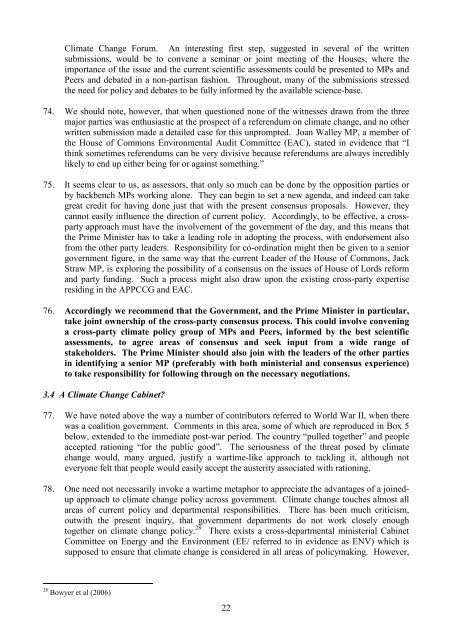All Party Parliamentary Climate Change Group Is a Cross-Party ...
All Party Parliamentary Climate Change Group Is a Cross-Party ...
All Party Parliamentary Climate Change Group Is a Cross-Party ...
You also want an ePaper? Increase the reach of your titles
YUMPU automatically turns print PDFs into web optimized ePapers that Google loves.
<strong>Climate</strong> <strong>Change</strong> Forum. An interesting first step, suggested in several of the written<br />
submissions, would be to convene a seminar or joint meeting of the Houses, where the<br />
importance of the issue and the current scientific assessments could be presented to MPs and<br />
Peers and debated in a non-partisan fashion. Throughout, many of the submissions stressed<br />
the need for policy and debates to be fully informed by the available science-base.<br />
74. We should note, however, that when questioned none of the witnesses drawn from the three<br />
major parties was enthusiastic at the prospect of a referendum on climate change, and no other<br />
written submission made a detailed case for this unprompted. Joan Walley MP, a member of<br />
the House of Commons Environmental Audit Committee (EAC), stated in evidence that “I<br />
think sometimes referendums can be very divisive because referendums are always incredibly<br />
likely to end up either being for or against something.”<br />
75. It seems clear to us, as assessors, that only so much can be done by the opposition parties or<br />
by backbench MPs working alone. They can begin to set a new agenda, and indeed can take<br />
great credit for having done just that with the present consensus proposals. However, they<br />
cannot easily influence the direction of current policy. Accordingly, to be effective, a crossparty<br />
approach must have the involvement of the government of the day, and this means that<br />
the Prime Minister has to take a leading role in adopting the process, with endorsement also<br />
from the other party leaders. Responsibility for co-ordination might then be given to a senior<br />
government figure, in the same way that the current Leader of the House of Commons, Jack<br />
Straw MP, is exploring the possibility of a consensus on the issues of House of Lords reform<br />
and party funding. Such a process might also draw upon the existing cross-party expertise<br />
residing in the APPCCG and EAC.<br />
76. Accordingly we recommend that the Government, and the Prime Minister in particular,<br />
take joint ownership of the cross-party consensus process. This could involve convening<br />
a cross-party climate policy group of MPs and Peers, informed by the best scientific<br />
assessments, to agree areas of consensus and seek input from a wide range of<br />
stakeholders. The Prime Minister should also join with the leaders of the other parties<br />
in identifying a senior MP (preferably with both ministerial and consensus experience)<br />
to take responsibility for following through on the necessary negotiations.<br />
3.4 A <strong>Climate</strong> <strong>Change</strong> Cabinet?<br />
77. We have noted above the way a number of contributors referred to World War II, when there<br />
was a coalition government. Comments in this area, some of which are reproduced in Box 5<br />
below, extended to the immediate post-war period. The country “pulled together” and people<br />
accepted rationing “for the public good”. The seriousness of the threat posed by climate<br />
change would, many argued, justify a wartime-like approach to tackling it, although not<br />
everyone felt that people would easily accept the austerity associated with rationing.<br />
78. One need not necessarily invoke a wartime metaphor to appreciate the advantages of a joinedup<br />
approach to climate change policy across government. <strong>Climate</strong> change touches almost all<br />
areas of current policy and departmental responsibilities. There has been much criticism,<br />
outwith the present inquiry, that government departments do not work closely enough<br />
together on climate change policy. 28 There exists a cross-departmental ministerial Cabinet<br />
Committee on Energy and the Environment (EE/ referred to in evidence as ENV) which is<br />
supposed to ensure that climate change is considered in all areas of policymaking. However,<br />
28 Bowyer et al (2006)<br />
22
















